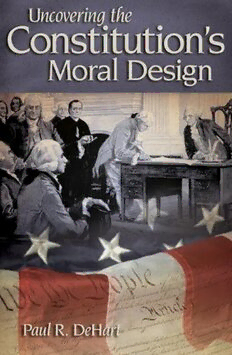
Uncovering the Constitution's Moral Design PDF
311 Pages·2007·1.256 MB·English
Most books are stored in the elastic cloud where traffic is expensive. For this reason, we have a limit on daily download.
Preview Uncovering the Constitution's Moral Design
Description:
Rejecting the standard approach of the intellectual historian, DeHart applies the method of inference to the best explanation to ascertaining our Constitution s moral meaning. He distinguishes the Constitution s intention from the subjective intentions of the framers, teasing out presuppositions that the document makes about the nature of sovereignty, the common good, natural law, and natural rights. He then argues that the Constitution constrains popular sovereignty in a way that entails a real common good, transcendent of human willing and promotive of human well being; but he points out that while the Constitution presupposes a real common good, it also implies a natural law that prescribes the common good. In critiquing previous attempts at describing and evaluating the Constitution s normative framework, DeHart demonstrates that the Constitution s moral framework corresponds largely to classical moral theory.
See more
The list of books you might like
Most books are stored in the elastic cloud where traffic is expensive. For this reason, we have a limit on daily download.
